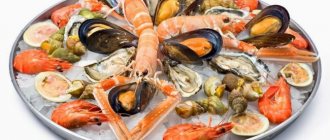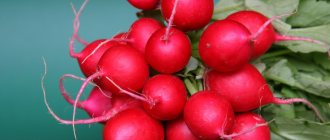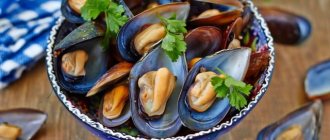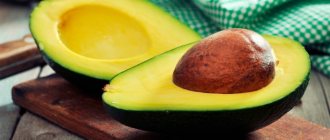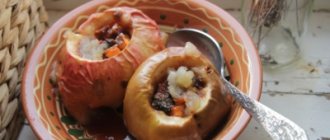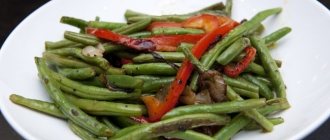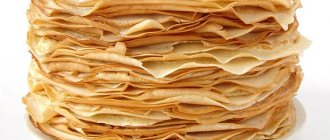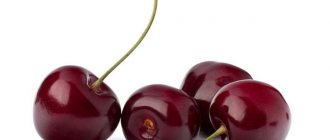Hello dear readers. You probably know how important fruits and vegetables are in a nursing woman’s diet. In this article we will talk about exotic fruits that grow far beyond the borders of our state, namely pineapples. You will learn what beneficial properties this product has, what possible risks exist when using it, what rules should be followed when consuming and choosing this fruit, and also find out whether canned pineapples can be included in your diet.
Pineapple - an exotic fruit
Despite the fact that this fruit grows outside our country, it is a rich source of vitamins and minerals, so necessary during the postpartum period. Although it has a sweet taste, it is a low-calorie product. So, per 100 grams of pineapple pulp there are only 48 kilocalories.
Valuable qualities
- High content of ascorbic acid. Helps strengthen the body's protective functions.
- Pineapple is one of the few fruits that can boast such a large presence of B vitamins in its composition. It has a positive effect on metabolic processes, as well as on the condition of the elements of the circulatory system.
- Vitamin A, with the participation of potassium, increases the performance of the cardiovascular system.
- Nicotinic acid, which is part of pineapple, has a beneficial effect on the functioning of the digestive, excretory and circulatory systems.
- Zinc, as well as magnesium, play a significant role in the functioning of the nervous system and also help get rid of fatigue.
- Pineapple contains bromelain, an enzyme that has a beneficial effect on digestive processes. Helps in the fight against hemorrhoids.
- The fruit contains a large amount of fiber, which improves the process of peristalsis in the intestines.
- Tones organs and tissues, especially muscle fibers.
- Helps get rid of dizziness, migraines, and also fight insomnia.
- Normalizes blood pressure, prevents the formation of blood clots.
- Helps remove excess water from the body, relieves swelling.
- Acts as a prophylactic against the development of heart attack or stroke.
- It has a positive effect on the restoration of the body due to infectious diseases.
- Has an analgesic effect for pain in joints and muscles.
- Used as a diuretic, it is also good against attacks of nausea and vomiting.
Possible risks
- Due to the high content of organic acids, it is not recommended for women with diagnosed gastritis with high acidity, stomach ulcers or gastroduodenitis.
- It is not recommended to eat pineapple during pregnancy. This is due to its effect on the contraction of muscle fibers, which during pregnancy can lead to uterine tone, and, accordingly, to the threat of miscarriage.
- The risk of developing an allergic reaction cannot be excluded.
- It is not recommended for use by people with low blood pressure or sudden changes in blood pressure.
- People who have sensitive teeth should use pineapple with caution, as the organic acids contained in pineapple can negatively affect the enamel.
- Contraindicated in case of individual intolerance.
How is pineapple harmful for a nursing mother and her baby?
First of all, pineapple in a nursing mother can cause a severe allergic reaction or signs of food intolerance that appear a few days after consumption.
If a woman’s body reacts quickly and vividly to an allergen, in children doctors observe a slowed down and sometimes even hidden course of a progressive process that involves many organs and tissues.
An allergic reaction to pineapple affects the respiratory, digestive, and nervous systems, expressed in irritation and itching of the skin, redness and swelling of the mucous membranes, difficulty breathing and swallowing, digestive disorders and respiratory symptoms. Children with allergies are overly excitable, eat and sleep poorly. The negative impact of pineapple on the health of a nursing mother does not end there.
Fresh fruits are rich in acids that can negatively affect the condition of tooth enamel, as well as cause discomfort due to increased acidity in the gastrointestinal tract.
So can a nursing mother have pineapple? No specialist will be able to give a clear and unambiguous answer to this question, since all women and their children have their own predispositions and body characteristics.
If before giving birth the expectant mother regularly consumed this product without noticing any negative consequences, it is obvious that pineapple can also be eaten during breastfeeding, adhering to strict measures and caution. In cases where the pulp of an exotic fruit is a new product for a woman, it is better to postpone tasting until the baby begins to feed on his own.
What can a nursing mother eat - video
Modern technologies give humanity the opportunity to enjoy juicy fruits and berries at any time of the year - just take out the treasured jar of your favorite dessert from the refrigerator.
Canned pineapples during breastfeeding often raise a number of questions - for example, should a young mother eat such a product at all and is it harmful to a newborn baby who is fed breast milk? Usually, such fears are noticeably embellished, because strict restrictions in the diet of a new mother are justified only when the baby is still very small or sick.
Is it possible to eat pineapple while breastfeeding?
Now, knowing how healthy pineapple is, many mothers will want to introduce it into their diet. However, some experts advise refraining from eating this fruit until the end of the lactation period. This is due to the fact that, in addition to its valuable qualities, pineapple has organic acids that can negatively affect tooth enamel and can irritate the intestinal and gastric mucosa of both mother and child. In addition, pineapple is a fairly allergenic product.
But there is an opinion that, despite all the risks, pineapple can be consumed by women who are breastfeeding, starting from four months after the birth of the child. Because the vitamins, minerals and enzymes contained in its composition have a beneficial effect on the condition of the body of the mother and child, and also help to recover after childbirth and improve the development of the baby.
It is important not to forget that introducing a new fruit should start with small portions. For the first time, you can literally take half a teaspoon of pineapple pulp. It is advisable to try it before lunch. This way, you can see whether the food you took had any effect on the condition of the baby. If the baby feels restless, some kind of rash, redness, or digestive problems appear, then you should immediately stop introducing pineapples into the mother’s diet. If no atypical reactions from the baby’s body are detected within two days, the mother can gradually increase her portion, reaching the daily norm of 200 grams, no more. It is important to know that taking pineapples cannot be done every day. You should limit yourself to two uses per week.
I introduced pineapples into my diet when my son was 5 months old. Even though I followed all the recommendations, the child’s cheeks turned red. So I had to give up this delicacy.
The benefits of nectarine for women during the postpartum period
100 g of dried fruit contains 274 kcal - this is not much, but they contain a large amount of carbohydrates. If you tend to be overweight, you should limit the amount of fruit you eat so that you don’t have to struggle with extra pounds later. Carbohydrates from dates are quickly absorbed and converted into energy that needs to be used somewhere.
At the same time, dates, like other dried fruits, are recommended as a snack for those who adhere to healthy eating rules - they are a tasty and healthy alternative to candy, cakes and other unhealthy sweets. The main thing is to know when to stop!
There are some contraindications; fruits should not be consumed:
- for disorders of the pancreas, pancreatitis;
- for diabetes mellitus;
- for certain intestinal diseases (colitis);
- for gastric ulcers;
- for liver diseases.
Such a fetus, of course, will help restore strength to a young mother after childbirth and pregnancy, normalize weight and metabolism, but the highest priority is the health and well-being of the newborn baby. In this regard, traditional medicine, represented by domestic “old school” pediatricians, most often advises a nursing mother to give up nectarines.
Can a nursing mother have nectarine when her baby is one month old? From the moment the baby turns one month old, the young mother’s diet needs to be gradually made more varied, including nectarine for breastfeeding.
However, this must be done carefully, introducing no more than one new product daily
It is advisable to do this in the morning in order to track the reaction of the child’s body to a particular dish. If you notice any rashes or bloating in your baby, of course, you should avoid this product during breastfeeding. Even if you do not observe any unpleasant symptoms in your baby, you should not overuse a product such as nectarine; moderation is required in everything.
Pediatricians recommend eating no more than three fruits daily. These fruits are also most useful at the end of July and August, as this is the period of their natural ripening. Unfortunately, earlier fruits are loaded with nitrates, so they can do more harm than good. You should follow the same principle when introducing other new products into your diet.
Rules of use
- It is recommended to introduce pineapple into the diet of a nursing woman from 6 months, but it is also allowed from the age of four months.
- You should not rely on pineapples if this fruit did not arouse your particular interest even before pregnancy. Now is not the time to experiment.
- You prefer only quality products.
- Start introducing this fruit with small portions. Take half a teaspoon of pulp and eat it in the morning. Monitor your baby's health. If something happens that differs from the usual norms, then you should exclude pineapples from your diet. If nothing was found within two days, the child behaves as before - the mother can gradually increase her portion, the maximum daily norm is 200 grams of the pulp of this fruit.
- You should not eat pineapple more than 2 times a week.
- Mommy should understand what risks exist when consuming this fruit and exclude it from her diet if she is diagnosed with any contraindications.
Selection requirements
It is very important to choose a quality product. To determine how natural and ripe a fruit is, you will need the following steps:
- It is important to pay attention to what the pineapple peel looks like. The surface of the fruit should be uniform, the same color (brownish tint). Do not buy fruits that have dark spots.
- The freshness of the fruit will be indicated by the presence of a green tail. However, it should come off easily. If it holds tightly, this indicates that the pineapple is not yet ripe.
- Make sure that the pineapple is moderately soft and elastic.
- When you tap the surface of the pineapple, a dull sound is heard.
Canned pineapples while breastfeeding
Only fresh fruits are allowed into a young mother’s diet. Canned pineapple is contraindicated during lactation. If we are talking about home canning, then such products can be consumed, but with extreme caution. If you buy ready-made products, then these almost completely contain preservatives, dyes, chemical agents, flavor enhancers, as well as syrup with a high sugar content. All these components can negatively affect the health of a nursing woman, and especially the health of a small toddler. That is why you should not include canned pineapples in the diet of a nursing mother.
Now you know what a positive effect a representative of exotic fruit - pineapple - has. It is indeed a low-calorie product and can help reduce excess weight. But the most important thing is that it contains a large complex of vitamins and minerals, enzymes that have a positive effect on digestive processes in the body. The main thing that a mother should not forget about is that you should not exceed the daily allowance, and also not eat pineapples too often. Otherwise, such a product will have a minimum of benefit and a maximum of harm. Follow all the recommendations and advice, and then such a delicious exotic fruit will bring extremely positive effects to your body and the body of your little one.
Controversial fruit
Doctors recommend that women adhere to a strict diet during lactation and eat food that is not only healthy, but also acceptable for the baby’s fragile body. “Tropical cone” is among those products whose attitude is ambiguous. On the one hand, it is rich in vitamins, macro- and microelements, and on the other hand, it is a potential allergen.
For colds and for the heart
If we talk about the benefits of the product, then it is a super store of vitamin C, which strengthens the immune system. Even lemon contains an order of magnitude less ascorbic acid than pineapple. The fruit also contains the enzyme bromelain, which improves digestion, relieves inflammation during injuries and prevents the formation of blood clots. What other qualities does the “tropical pine cone” have? What arguments are there in favor of eating pineapple during breastfeeding?
- Improves vision and protects against... This effect is due to the high content of vitamins A and C in the treat.
- Calms nerves, invigorates, improves metabolism. This happens because the fruit is rich in B vitamins: pyridoxine, riboflavin and thiamine.
- Quickly saturates the body. The high fiber content makes the product filling. At the same time, 100 g contains only 52 kcal.
- Normalizes blood pressure, improves heart function. The fruit copes with these tasks thanks to the potassium and magnesium in its composition.
What's in it
The table below provides a detailed analysis of the value of the product, how much and what beneficial substances are contained in 100 g of fruit pulp.
Table - Chemical composition of pineapple
| The nutritional value | Per 100 g | Macro- and microelements | Per 100 g | Vitamins | Per 100 g |
| Squirrels | 0.3 g | Calcium | 17 mg | PP | 0.3 mg |
| Fats | 0.1 g | Magnesium | 13 mg | A | 3 mcg |
| Carbohydrates | 11.8 g | Sodium | 1 mg | Beta carotene | 0.02 mg |
| Potassium | 134 mg | IN 1 | 0.06 mg | ||
| Phosphorus | 8 mg | AT 2 | 0.02 mg | ||
| Iron | 0.3 mg | AT 5 | 0.2 mg | ||
| Copper | 0.11 mg | AT 6 | 0.1 mg | ||
| Manganese | 0.93 mg | B9 (folic acid) | 5 mcg | ||
| Zinc | 0.12 mg | WITH | 11 mg | ||
| Selenium | 0.1 mcg | E | 0.2 mg |
Some modern studies confirm the ability of pineapple to fight cancer cells. However, for the fruit to really bring a healing effect, it must be consumed fresh, regularly and in large quantities. For example, for arterial health you should eat about 200 g of pulp and drink a glass of fresh juice per day. But with such frequency and in such quantities, pineapple is strictly prohibited during lactation.
